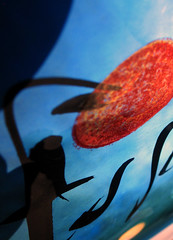I mentioned last time going to an Adyashanti Gathering and watching a DVD.
There was a woman talking with Adya. He asked her repeatedly and directly, “So, what happened? What simply happened?”
Amazingly, the woman was incapable of answering the direct question.
She had to spin a story.
Feeling somewhat savvy, she had ready explanations and elaborations.
At first, I didn’t like her. In time, I saw that we all spin out our stories.
We just do it a bit more subtlely.
Let's say you are living in an unpleasant place.
It's cold, it’s wet or damp, or noisy, or cramped. And there you are sitting on a chair. It is the form that this moment takes, and you realize the limitations of that form.
And yet, you allow this moment to be as it is.
Some people confuse that with accepting a story they are telling themselves in their head concerning this moment.
And that is a mistake that some people make, I have noticed that.
When we speak of allowing this moment to be
they confuse that with creating some interpretation of this moment which is a story…
… say the stock market has crashed and your wife has left you, a synchronistic event. And then the story comes in, in your mind which says:
‘Okay, you've worked for nothing for 25 years…you failed at your business and you failed at your marriage. There's no point in even carrying on now because at your age what can you do? Who would want you? You haven't got enough time to build up another business empire.’
The story goes on in your head.
It's an interpretation of this moment.
I failed.
It's been pointless.
My life has come to nothing.
(And this is a simple story. Most stories are more complicated than that.)
The story is not this moment.
The story is the story in your head. It is mind-forms. Object-consciousness.
So what is this moment? What is the form of this moment?
The form of this moment is not the story about this moment;
it is the simple appearance of this moment
which is chair, walls, window, cold, noisy neighbors, an unpleasant smell.
But even unpleasant is the beginning of a story.
Just sit. Just this.
This is the moment. This is Now.
And you are sitting (perhaps you still have a chair.)
You're sitting on a chair.
And that's a strange thing.
What happens if I allow this moment without the story?
And then, oh,
strange,
suddenly, by allowing the form,
suddenly, there's a peace that arises from a deeper place.
And you look around at the forms and it is that spacious Presence that is there then. When the forms are no longer obscuring that.
But, you can only get to that when you allow the forms...
that which appeared to prevent you from finding yourself is …actually the doorway…
Not the story, but the simple form of this moment…
Eckhart Tolle, notes from his Omega Retreat
So, by my count, Eckhart Tolle is telling us to stop the story telling.
So, is Adya.
So is Byron Katie.
And so was Epictetus ca. 100 AD.
We are disturbed not by what happens to us,
but by our thoughts about what happens.
His son is dead. What happened? His son is dead. Nothing else? Not a thing.
His ship is lost. What happened? His ship is lost.
He was carried off to prison. What happened? He was carried off to prison.
But the observation: 'He has fared ill,' is an addition that each man makes on his own responsibility.
(Discourses 3.8.1–5, trans. Oldfather)
I think it’s time I learn this lesson.
Monday, June 30, 2008
Prison or Paradise: Part Two
Labels:
Adyashanti,
Byron Katie,
Eckhart Tolle,
Epictetus,
Inuit story,
prison
Subscribe to:
Post Comments (Atom)


No comments:
Post a Comment